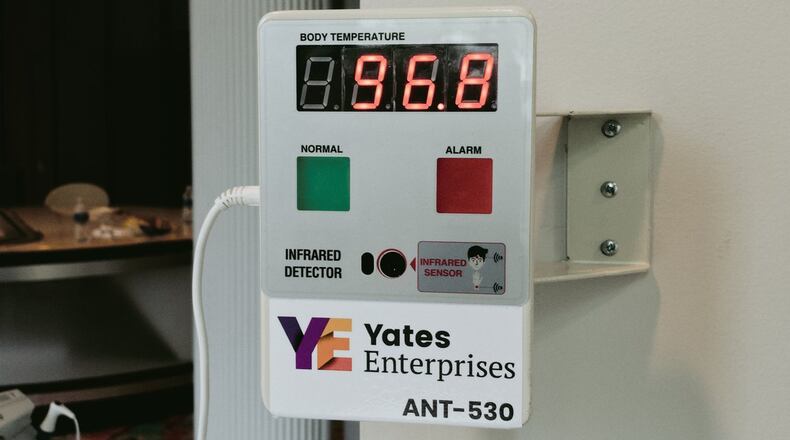If you are a volunteer or staffer at the Atlanta Community Food Bank, you may be better protected from the spread of COVID-19, thanks to a donation from a Chicago-based company.
Yates Enterprises recently donated a wall-mounted, non-contact infrared thermal detector that will screen for elevated temperatures as employees and volunteers enter the building. The monitor will be placed at the main entrance to the East Point-based nonprofit, which distributes food through more than 700 partner organizations in 29 counties across metro Atlanta and North Georgia.
“It certainly will help us prepare to be able to have a higher volume of people coming through our doors,” said Chief Operations Officer Stacey Koehnke. She hopes it will also give people peace of mind when they come to work or visit the nonprofit.
Related: After opening for in-person worship, Ringgold church goes back to online
Gloves and masks are available for all employees to wear, and social distancing is strictly enforced.
“We want to make sure the community feels safe and the staff feels safe,” she said.
An elevated temperature is one of the early symptoms of COVID-19, although experts caution that some people are asymptomatic and still have the virus.
The federal Centers for Disease Control and Prevention advises people to wear masks, frequently wash their hands or use sanitizer, and practice social distancing.
Currently about half of the ACFB’s 125-person staff is coming into the building. The rest are working remotely because of the pandemic.
Instead of the usual 100 or so volunteers that come daily, members of the National Guard are performing those duties as the nonprofit works on a reopening plan.
Temperatures are taken at the front desk with a hand-held thermometer.
Related: Virus is changing how chaplains help others
The ACFB would like to acquire a second detector for another entrance used by volunteers and agencies that pick up food.
If someone is shown to have a high temperature, Koehnke said, that person will be sent home for 72 hours and advised to follow up with a health care provider.
In 2019, the ACFB distributed more than 60 million meals to food pantries, community kitchens, shelters, senior centers, schools and child care centers. Its distribution includes fresh produce, frozen protein, canned goods and dairy.
ACFB CEO Kyle Waide estimates there has been a 30% to 40% rise in the number of people who are now getting food from food drives and other emergency sources, compared to mid-March, according to a previous article in The Atlanta Journal-Constitution.
The detector is assembled and sold by Yates Enterprises, founded by Dr. William Yates. The company offers a line of protection products. This particular model sells for around $5,000.
Yates, whose medical career has included being a trauma surgeon, said that the company has donated several of the machines around the nation to nonprofits and a courthouse.
His company sold metal detectors to help prevent the gun violence he saw as a trauma surgeon, then COVID-19 “began spreading like wildfire,” he said in an interview.
“COVID came along and it shifted the whole focus. COVID is like the boogeyman. You can’t see it. You can’t touch it. Here’s something simple we can do, in lieu of waiting to test everybody, to help stop the spread of this virus as well as wearing masks, gloves and using common sense.”
The readings have a margin of error of 0.5 degrees plus or minus, he said. If a person at the ACFB gets a higher reading — say 99.5 degrees — the person is retested.
He said the detector can be used at medical facilities, schools, restaurants, “any public place where people gather.”
About the Author
Keep Reading
The Latest
Featured


